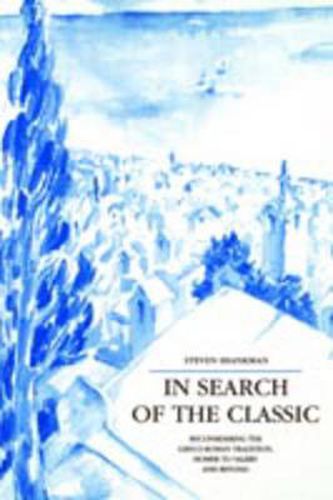Readings Newsletter
Become a Readings Member to make your shopping experience even easier.
Sign in or sign up for free!
You’re not far away from qualifying for FREE standard shipping within Australia
You’ve qualified for FREE standard shipping within Australia
The cart is loading…






This is a stimulating book that should provoke rethinking many common assumptions about literary history. It offers both a coherent theoretical framework and many fresh insights into particular works. -Comparative Literature The classical, Steven Shankman argues, should be not confused with a particular historical period of Western antiquity, although it may owe its original articulation to the literary and philosophical explorations of ancient Greek authors. Shankman’s book searches for and attempts to formulate the shape of the continuing presence-as embodied in particular literary works mainly from Western antiquity and the neoclassical and modern periods-of what the author calls a classical understanding of literature. For Shankman, literature, defined from a classical perspective, is a coherent, compelling, and rationally defensible representation that resists being reduced either to the mere recording of material reality or to the bare exemplification of an abstract philosophical precept.He derives his definition largely from his reading of Greek literature from Homer through Plato, from the history of literary criticism, and from the Greco-Roman tradition in English, American, and French literature. Shankman reveals unsuspected yet convincing connections among authors of such widely disparate times and places. His idea of the classic that authorizes these connections is presented as normative, thus making possible the evaluation of literary works and, in turn, forthright discussion of what constitutes the literary as distinct from other kinds of discourse. Shankman’s study runs counter to a strong tendency of contemporary criticism that argues precisely against any distinct category of the literary.
He offers a series of interpretations that cumulatively advance theoretical discussion by challenging scholars to rethink the critical paradigms of postmodernism. At the center of the book is a discussion of the quintessentiall
$9.00 standard shipping within Australia
FREE standard shipping within Australia for orders over $100.00
Express & International shipping calculated at checkout
This is a stimulating book that should provoke rethinking many common assumptions about literary history. It offers both a coherent theoretical framework and many fresh insights into particular works. -Comparative Literature The classical, Steven Shankman argues, should be not confused with a particular historical period of Western antiquity, although it may owe its original articulation to the literary and philosophical explorations of ancient Greek authors. Shankman’s book searches for and attempts to formulate the shape of the continuing presence-as embodied in particular literary works mainly from Western antiquity and the neoclassical and modern periods-of what the author calls a classical understanding of literature. For Shankman, literature, defined from a classical perspective, is a coherent, compelling, and rationally defensible representation that resists being reduced either to the mere recording of material reality or to the bare exemplification of an abstract philosophical precept.He derives his definition largely from his reading of Greek literature from Homer through Plato, from the history of literary criticism, and from the Greco-Roman tradition in English, American, and French literature. Shankman reveals unsuspected yet convincing connections among authors of such widely disparate times and places. His idea of the classic that authorizes these connections is presented as normative, thus making possible the evaluation of literary works and, in turn, forthright discussion of what constitutes the literary as distinct from other kinds of discourse. Shankman’s study runs counter to a strong tendency of contemporary criticism that argues precisely against any distinct category of the literary.
He offers a series of interpretations that cumulatively advance theoretical discussion by challenging scholars to rethink the critical paradigms of postmodernism. At the center of the book is a discussion of the quintessentiall